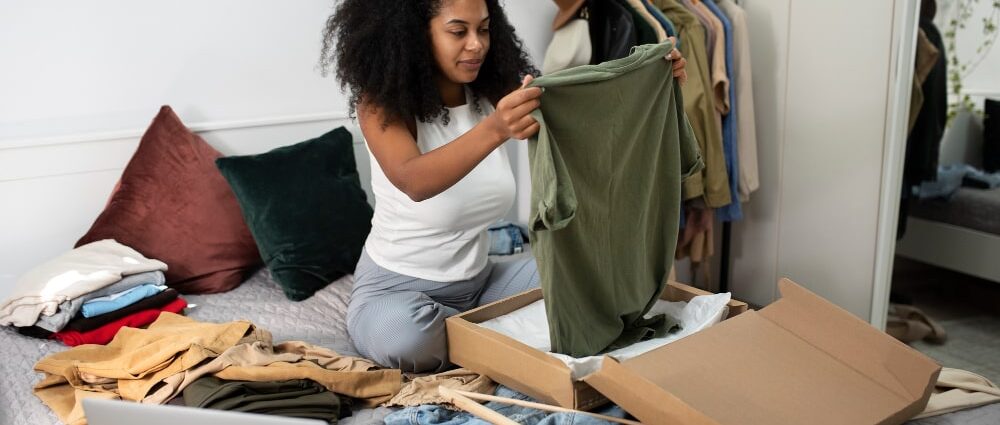For years, I believed happiness came from having more—more clothes, a bigger house, the latest gadgets. But that constant chase left me feeling empty. Eventually, I realized the real journey was about breaking free from societal expectations and learning to define happiness on my own terms.
Why I Stopped Believing That More Stuff = More Happiness
For years, I thought happiness was just one purchase away. A new outfit, a bigger house, a better car—if I just had these things, life would feel complete.
But every time I got what I thought I needed, the excitement faded. I’d move on to wanting something else, convinced that the next thing would finally bring lasting happiness. Spoiler alert: it never did.
Eventually, I started questioning the cycle. Why was I always chasing more? And why did I feel pressure to measure my success by the things I owned?
Breaking free from societal expectations and the idea that material possessions equal happiness wasn’t easy. It meant unlearning habits, questioning norms, and redefining what truly mattered to me.
Here’s what I discovered along the way.
Breaking Free from the Happiness Lie Society Sells Us
From the time we’re kids, we’re taught to believe that success and happiness look a certain way:
- A big house in a nice neighborhood
- A high-paying job with a fancy title
- A new car, designer clothes, and the latest tech
- Exotic vacations and picture-perfect social media posts
It’s the “American Dream” (or whatever version your culture promotes), and it tells us that we should always be striving for more. If you don’t have these things, you must not be trying hard enough.
But here’s the truth: happiness doesn’t come from stuff.
Sure, nice things can be enjoyable, but they don’t fill emotional voids, heal insecurities, or create lasting fulfillment.
If money and possessions truly made people happy, why are so many wealthy individuals still unfulfilled? Why do people with seemingly “perfect” lives still struggle with stress, anxiety, and emptiness?
I started asking myself these questions, and I realized I had been chasing the wrong things.
Steps I Took Toward Breaking Free from Societal Expectations
The first step to breaking free from societal expectations was recognizing that I had a choice. Just because the world told me to chase more didn’t mean I had to.
Here’s what helped me shift my mindset:
1. Questioning What I Really Wanted
Instead of asking, “What should I have by now?” I started asking, “What actually makes me happy?”
I realized that my happiest moments had nothing to do with material possessions. They were simple: meaningful conversations, time in nature, creative projects, and the feeling of being truly present.
2. Decluttering My Space (and My Mind)
I didn’t become a minimalist overnight, but I slowly started letting go of things I didn’t need. Clothes I never wore, gadgets collecting dust, decorative items that served no purpose.
As I decluttered, something unexpected happened—I felt lighter. Less stuff meant less stress, fewer distractions, and more clarity about what mattered.
3. Reframing My Definition of Success
For so long, I measured success by how much I had. But what if success wasn’t about accumulation?
What if success meant:
✔ Having control over my time
✔ Feeling content with what I already had
✔ Building deep relationships instead of collecting things
This shift in perspective changed everything.
The Freedom That Comes From Needing Less
Once I stopped chasing more, I felt a sense of freedom I never had before.
- No more financial stress from trying to keep up.
- No more clutter overwhelming my home and mind.
- No more comparing my life to someone else’s highlight reel.
I started focusing on experiences over possessions, and I became more intentional about where my time, money, and energy went.
Instead of buying new clothes, I found joy in wearing my favorite pieces on repeat.
Instead of upgrading my car, I appreciated that it got me where I needed to go.
Instead of filling my home with decor, I embraced the beauty of simplicity.
And you know what? I’ve never been happier.
How You Can Start Breaking Free Today
If you’re tired of the pressure to keep up, here’s how you can start shifting your mindset:
✔ Identify What Truly Makes You Happy. Take some time to reflect on when you’ve felt the most fulfilled. Chances are, it had nothing to do with stuff.
✔ Declutter What You Don’t Need. Let go of things that no longer serve you—physically and mentally.
✔ Stop Comparing Yourself to Others. Social media is a highlight reel, not real life. Focus on your own path.
✔ Redefine Success on Your Terms. What does a fulfilling life look like to you? Prioritize what matters.
✔ Practice Gratitude for What You Already Have. Instead of chasing the next thing, appreciate the abundance already in your life.
Happiness isn’t found in the next purchase—it’s found in how you choose to live each day.
Final Thoughts on Breaking Free from Societal Expectations
Breaking free from societal expectations doesn’t mean you have to give up everything or live an extreme minimalist lifestyle. It simply means recognizing that your worth isn’t tied to what you own.
You don’t need a bigger house, a newer car, or trendier clothes to be happy. You are already enough—just as you are.
When you stop chasing what society says you should want, you create space for what you truly want. And that? That’s real freedom.
Are you ready to redefine happiness on your terms?
FAQs
How do I stop feeling like I need to keep up with others?
Shift your focus inward. Ask yourself what genuinely makes you happy, rather than what society tells you should make you happy. Reducing exposure to social media comparisons can also help.
Is it possible to be happy without material success?
Absolutely. Many of the happiest people live simply and focus on meaningful experiences, relationships, and personal growth rather than material possessions.
What if I enjoy buying things?
There’s nothing wrong with enjoying nice things. The key is to buy intentionally—purchasing things that genuinely add value to your life instead of filling a void or trying to impress others.
How can I embrace minimalism without feeling deprived?
Minimalism isn’t about deprivation—it’s about choosing what truly matters. Keep what brings you joy and purpose, and let go of the rest.
How do I start letting go of stuff?
Begin with small steps. Declutter one area at a time, and ask yourself: “Do I truly need or love this?” If not, consider donating or selling it.
Suggested Links:

